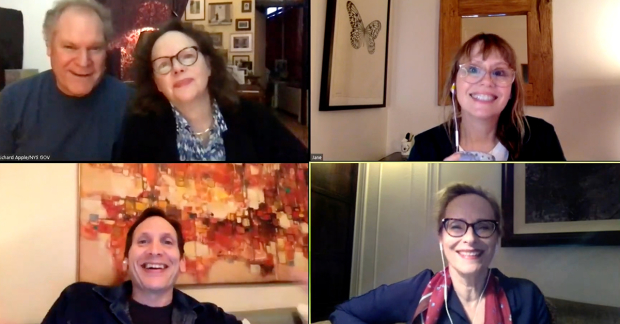Richard Nelson has produced the first great online work of the Covid-19 pandemic
Sarah Crompton reflects on some of her favourite online theatre experiences from the last few weeks

© Courtesy of the Public Theater
Somewhat to my surprise, I have watched a lot of theatre online in lockdown. As someone who prior to this strange new world went out three times a week, I had imagined that my grief at being separated from that experience would result in binge-watching TV box sets and closing theatre from my mind.
Well I've experienced the TV all right (Giri/Haji may I say, is a masterpiece), but I've also watched a lot of theatre from all over the world. I stayed up most of the night in fact, watching Take Me to the World, the Stephen Sondheim 90th birthday gala from New York (now available on YouTube) which despite a late start, was a triumphant vindication of the online format since it assembled such a wonderful cast. I actually leapt out of bed with joy when Christine Baranski, Meryl Streep, and Audra McDonald joined in "The Ladies Who Lunch" but I also found myself entranced by younger interpreters such as Aaron Tveit and Annaleigh Ashford.
I've also been enjoying productions from the archives, suddenly available online. For example, I've spent quite a bit of time digging around in the back catalogue of the Schaubühne Theatre in Berlin, who I have rarely seen, but whose productions are hugely influential and have consequently been fascinating to watch. Equally, I've been watching the National Theatre's Thursday streams with enormous pleasure, since its online programme has been brilliantly chosen both to be popular and to reveal the range of what they do.
Anyone who believes in theatre should watch What Do We Need to Talk About?
Watching Frankenstein, I was struck by the way that Mary Shelley's novel is a summation of the battle between the best and worst of humanity, the tensions between science and morality, between logic and emotion, that we are now seeing played out in the news every day. I could read that in the novel, of course (though it is a harder slog than you might imagine) but to see Benedict Cumberbatch and Jonny Lee Miller play out those questions, bringing great vitality and pathos to the experience, is to be drawn into the debate in a way that strikes you to the quick.
This is the power of theatre. It embodies stories, it makes them involve you in a way that TV box sets, however good, simply do not. Nowhere has this been more evident than in What Do We Need to Talk About?, a new play by Richard Nelson, that is screening on the website of the Public Theater in New York until Sunday and which anyone who believes in theatre should watch.
Nelson is a mysterious playwright in that he has never attained the degree of popularity that I feel his sensitive, probing work deserves. For years now, he has been working with the Public to create a series of sagas of ordinary life and its interaction with public events, involving first the fictional Apple family, then the Gabriels, who live in Rhinebeck, New York. All the plays work through a high degree of naturalism, where actors embody the imaginary characters as they respond to real and fictional events in their lives and in the world.
The stories the Apples tell reflect and amplify the kind of stories we are all telling each other now
It sounds complicated, but the experience in a theatre is extraordinary. (You can read my review of the Gabriels trilogy here.) You feel you are eavesdropping on a private conversation but one that illuminates the whole world. Using all he has learnt, Nelson has now produced the first great online work of the Covid-19 pandemic, as the Apples gather once again, like families across the world, not in person, but by Zoom, to catch up, to share their lives. It is quiet, low-key, immensely moving – and ultimately profound.
The characters eat (as they always do) and describe the changed life around them. They talk about dressing up to put out the garbage, the emotionally-freighted trips to the shops where the purchase of a key ingredient becomes a small triumph, about the challenges of working when you are in lockdown. One, Barbara, has just returned from hospital where she has survived Covid; another, Tim, is isolating in the spare room, separated from his nervous partner Jane.
Because Tim used to be an actor (he now runs a restaurant), they discuss the state of Broadway, and one of the questions they feel they need to talk about it, is what will happen to the theatre when the world emerges from quarantine. What is the role it has to play? Why do stories matter – and how do we tell them?
With rich humanity it answers those questions by its very existence. The stories the Apples tell in their fictional universe, reflect and amplify the kind of stories we are all telling each other now. They echo our fears and our hopes, they explain our need for community and for understanding. This play gives us a vehicle in which to understand ourselves. By transforming reality into art, Nelson and his magnificent actors give us a way of making sense of the senseless, of beginning to hold and comprehend incomprehensible terror and tragedy. It allows us to feel deeply in a space that is safe. It brings us together. As theatre always does and always will. It matters.












